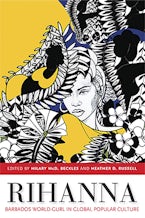Rihanna is arguably the most commercially successful Caribbean artist in history. She is Barbadian and has been unwavering in publicly articulating her national and regional belonging. Still, there have been varied responses to Rihanna’s ascendancy, among both Barbadians and the wider Caribbean community. The responses reveal as much about our own national and regional anxieties as they do about the artist herself. The boundary-transgressing, cultural icon Rihanna is subject to anxieties about her body language and latitude from her global audiences as well; however, the essays in this collection purposely seek to de-centre the dominance of the Euro-American gaze, focusing instead on considerations of the Caribbean artist and her oeuvre from a Caribbean postcolonial corpus of academic inquiry.
This collection brings together US- and Caribbean-based scholars to discuss issues of class, gender, sexuality, race, culture and economy. Using the concept of diasporic citizenship as a theoretical frame, the authors intervene in current questions of national and transnational circuits of exchange as they pertain to the commoditization and movement of culture, knowledge, values and identity. The contributors approach the subjects of Rihanna, globalization, gender and sexuality, commerce, transnationalism, Caribbean regionalism, and Barbadian national identity and development from different disciplinary and at times radically divergent perspectives. At the same time, they collectively work through the limitations, possibilities and promise of our best Caribbean imaginings.

